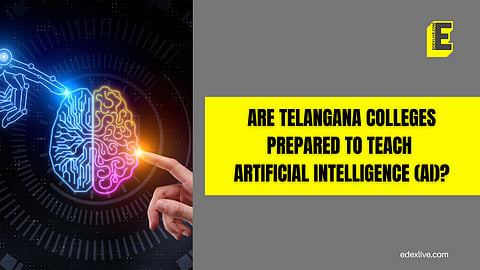

Despite the high demand for emerging tech courses such as Artificial Intelligence (AI), Machine Learning (ML), and Data Science in Telangana, a shortage of qualified teachers and inadequate infrastructure is leaving engineering students ill-prepared for the industry.
In response to the evolving Information Technology (IT) scenario, the Telangana government introduced new courses in emerging tech areas such as AI, ML, data science, robotics, cybersecurity and more in 2020-21. Although the government and colleges have made strides to train faculty members in these emerging technologies ever since, the shortage of qualified faculty remains a significant challenge. This has affected the quality of graduates from Telangana, as colleges claim that students are not very industry-ready.
Train the teacher?
“New courses were designed to align academic programmes with contemporary industry needs. However, the implementation of these courses faces a significant challenge: A shortage of adequately trained teachers. Despite introducing these forward-thinking courses, the gap between the number of available courses and the number of teachers equipped to deliver them remains substantial,” said Syed Jamsheed Ahmed, correspondent of a private engineering college in Telangana.
He further added, “This disconnect means that while the curriculum on emerging technology such as AI/ML may be up to date, the lack of qualified faculty hinders the effective dissemination of knowledge and skills to students. Consequently, this gap contributes to a situation where students, upon graduation, are not fully prepared to meet the practical demands and expectations of the industry.”
Colleges admit the situation is so dire that teachers of core engineering courses like civil and mechanical engineering are being required to take certification courses to teach emerging technologies.
“Many colleges are not keen on continuing courses in core engineering disciplines. As a result, faculty members teaching these subjects are required to upgrade their skill sets to include emerging technologies. They are encouraged to participate in one to two-week faculty development programmes and to voluntarily enroll in online courses to enhance their understanding of these new areas,” said KVK Rao, General Secretary of the All-India Federation of Self-Financing Technical Institutions, adding that a short faculty development programme is not sufficient to meet the technical needs of a course.
However, he acknowledged that the issue of ill-equipped faculty members is not limited to Telangana but is a nationwide problem due to the rapidly evolving IT scenario.
Not enough facilities?
Not only is faculty training inadequate, but many colleges also lack well-equipped laboratories, innovation and entrepreneurship hubs, and the necessary support, resources, and opportunities that enable students to pursue careers in emerging technologies. Experts opine that without addressing these critical aspects, efforts to make students industry-ready fall short, impacting both their career prospects and the industry’s ability to leverage fresh talent.
Adding to the challenge, many colleges face financial constraints that hinder their ability to invest in the latest technological tools and resources necessary for comprehensive training in emerging technologies. This financial strain exacerbates the issue, as even well-intentioned programmes and initiatives fall short without the requisite funding and support.
There are about 55,000 computer science engineering seats in Telangana, with more than 20,000 offered in emerging technologies. Following the All India Council for Technical Education's (AICTE) decision to lift the cap on engineering seats and allow top colleges to establish off-campuses, this number is expected to grow by an additional 20,000 seats. In light of this, the Telangana State Council of Higher Education (TGCHE) continues its efforts to equip faculty members to in turn make students industry ready.
“Apart from conducting large-scale faculty development programmes, the government has also pooled in industry experts as ‘professors in practice’ in various institutions. These industry experts teach students emerging tech such as AI/ML, data science, and cybersecurity from their industry experience, giving higher exposure to students,” said Prof Sriram Venkatesh, Secretary of TGCHE and Former Principal of the University College of Engineering, Osmania University, Hyderabad.
Continuous and ongoing
Furthermore, the rapid pace of technological advancement means that continuous professional development for faculty is essential. Regular updates to the curriculum and teaching methodologies are required to keep pace with industry standards. This continuous learning curve can be daunting for educators who are already stretched thin with existing responsibilities.
To further prepare students for the industry, TGCHE encourages engineering colleges to collaborate with the industry.
“We have signed a memorandum of understanding (MoU) with the Data Security Council of India to help our students secure internships in data science. We have encouraged colleges to sign similar MoUs with companies in these emerging sectors to offer the kind of exposure required to make students industry-ready,” said Prof Venkatesh, adding that collaborations between educational institutions and tech companies can bridge the gap between academic knowledge and practical industry skills. Internships, workshops, and real-world projects facilitated by industry partners provide invaluable hands-on experience to students, making them more attractive to potential employers.
According to the AICTE data for 2023-24, 265 approved colleges in Telangana offer engineering courses at the undergraduate (UG), postgraduate (PG) and diploma levels. These colleges employ 33,657 faculty members teaching various engineering and technology courses at UG, PG, and diploma levels, with only 5,134 engaged in teaching undergraduate courses.
